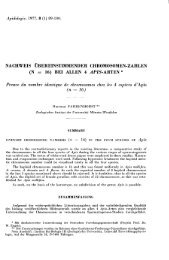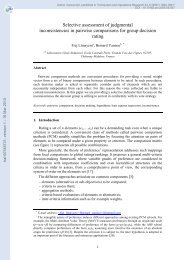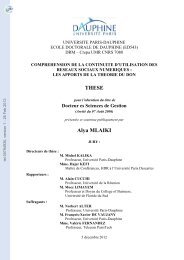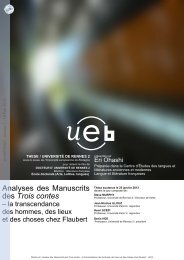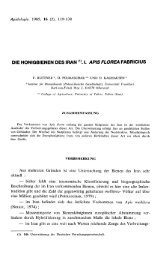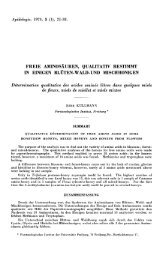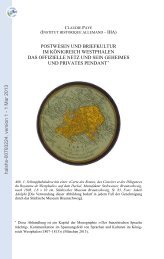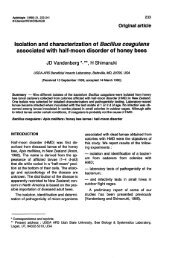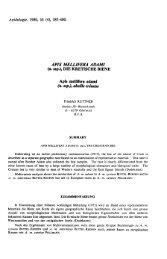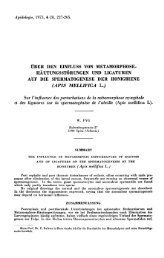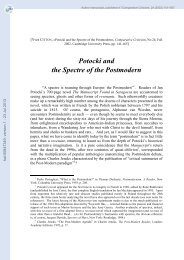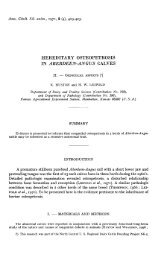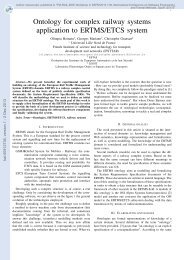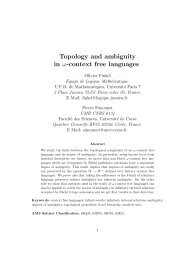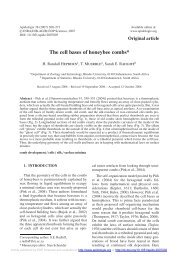Adaptative high-gain extended Kalman filter and applications
Adaptative high-gain extended Kalman filter and applications
Adaptative high-gain extended Kalman filter and applications
You also want an ePaper? Increase the reach of your titles
YUMPU automatically turns print PDFs into web optimized ePapers that Google loves.
tel-00559107, version 1 - 24 Jan 2011<br />
Abstract<br />
Keywords - nonlinear observers, nonlinear systems, <strong>extended</strong> <strong>Kalman</strong> <strong>filter</strong>,<br />
adaptive <strong>high</strong>-<strong>gain</strong> observer, Riccati equation, continuous-discrete observer, DCmotor,<br />
real-time implementation.<br />
The work concerns the “observability problem” — the reconstruction of a dynamic<br />
process’s full state from a partially measured state— for nonlinear dynamic systems.<br />
The Extended <strong>Kalman</strong> Filter (EKF) is a widely-used observer for such<br />
nonlinear systems. However it suffers from a lack of theoretical justifications <strong>and</strong><br />
displays poor performance when the estimated state is far from the real state, e.g.<br />
due to large perturbations, a poor initial state estimate, etc. . .<br />
We propose a solution to these problems, the Adaptive High-Gain (EKF).<br />
Observability theory reveals the existence of special representations characterizing<br />
nonlinear systems having the observability property. Such representations<br />
are called observability normal forms. A EKF variant based on the usage of a<br />
single scalar parameter, combined with an observability normal form, leads to an<br />
observer, the High-Gain EKF, with improved performance when the estimated<br />
state is far from the actual state. Its convergence for any initial estimated state<br />
is proven. Unfortunately, <strong>and</strong> contrary to the EKF, this latter observer is very<br />
sensitive to measurement noise.<br />
Our observer combines the behaviors of the EKF <strong>and</strong> of the <strong>high</strong>-<strong>gain</strong> EKF. Our<br />
aim is to take advantage of both efficiency with respect to noise smoothing <strong>and</strong><br />
reactivity to large estimation errors. In order to achieve this, the parameter that<br />
is the heart of the <strong>high</strong>-<strong>gain</strong> technique is made adaptive. Voila, the Adaptive<br />
High-Gain EKF.<br />
A measure of the quality of the estimation is needed in order to drive the adaptation.<br />
We propose such an index <strong>and</strong> prove the relevance of its usage. We provide a<br />
proof of convergence for the resulting observer, <strong>and</strong> the final algorithm is demonstrated<br />
via both simulations <strong>and</strong> a real-time implementation. Finally, extensions<br />
to multiple output <strong>and</strong> to continuous-discrete systems are given.



